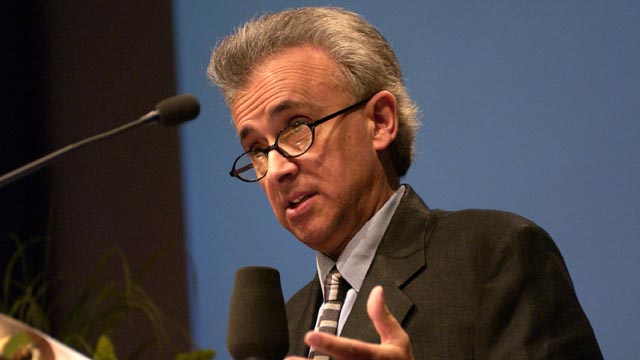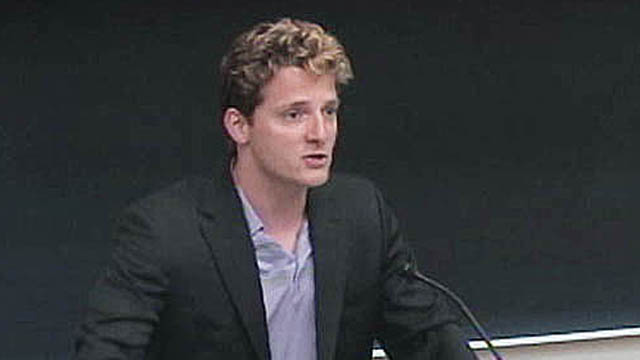Technology & Innovation
All Stories
“When people search [the Internet], they aren’t just looking for nouns or information; they are looking for action.” A venture capitalist says search engines are changing for the better.
“Not every investor is trembling with anxiety over the next financial blowup. Some are embracing the market’s volatility—and constructing portfolios to profit from it.”
The government of Chile is recruiting American entrepreneurs to spend six months starting a business in Santiago, offering each candidate $40,000 and a one-year visa to the country.
New York Times journalist Andrew Sorkin discusses his take on the Wall Street crash, whether financial CEOs are evil, the future of journalism and how business is likely to change in the future.
Slate reports on why we love us a good summer scandal, whether its Gibson or Blago: “If communities are enclaves of shared norms, then scandals are what consolidate a community.”
“While America’s super-rich congratulate themselves on donating billions to charity, the rest of the country is worse off than ever.” Der Spiegel reports on the rising rich-poor gap in the U.S.
Polygamy is alive and well in parts of America. According to researchers at Brigham Young University, there are 30,000 to 50,000 people currently living a polygamist lifestyle in the United […]
In the Atlantic Wire series looking at how people stay on top of the news without surrendering to its chaos, Wired magazine editor-in-chief Chris Anderson shares his tips.
Promiscuity is an interesting subject. There was a time, in the United States at least, when there was a pronounced double-standard about “sleeping around”: women who had many sex partners […]
Erik Olin Wright, a professor of sociology at the University of Wisconsin at Madison, thinks providing free transportation would reduce traffic and pollution, and create more efficient labor markets.
Google CEO Eric Schmidt says that public figures of the future will have to contend with their own Facebook party photos. Should we expect name changes en masse as a solution?
“A slowdown or double-dip recession could put entrepreneurs to the test.” The Director of the Center for Entrepreneurship at Belmont University suggests strategies for surviving.
“Growth is different from consumerism,” says former Labor Secretary Robert Reich. Properly defined, growth is a measure of society’s well-being, not a code word for exploitation.
A recent article has me worried; apparently there is a penalty associated with being a “sexy” professor.* Until now, all I had been worried about was that the mother of […]
With federal interest rates already near zero, the Federal Reserve is using an unconventional tool called quantitative easing—buying large assets to inject more money into the economy.
Judge Richard Posner supports a value-added tax as part of an overall tax reform plan to encourage entrepreneurial development and avoid increasing the debt burden on the future.
Do you have sex like a Finn or a Bangladeshi? Researchers have surveyed “sociosexuality”—the scientific euphemism for promiscuity—in 48 countries. Where do you rank?
This past week, three top experts stopped by the Big Think offices for a video interview: behavioral neurologist Antonio Damasio, C++ creator Bjarne Stroustrup, and kidnapping victim Stanley Alpert. USC […]
Google CEO Eric Schmidt says that technological advancement has historically struck a blow against privacy, but that more transparency in society creates more trust among its members.
“An Obama task force says that carbon capture—in which greenhouse gas emissions would be stored underground—is feasible. It’s seen as a promising way to combat global warming.”
“Could financial incentives that encourage fat people to lose weight solve the obesity crisis?” Experiments in paying people to lose weight have met with success in the U.S. and U.K.
“Over the last decade there has been a fundamental revolution in how we communicate,” says Matthew Nisbet, professor of communications at American University and Big Think’s newest blogger. The rigid […]
Revolutions in communication technology and digital media have transformed almost every sector of society, altering the way we express ideas, participate in public debates, connect with others, entertain ourselves, and […]
“By focusing all our attention on whether we need a bigger stimulus or a smaller deficit, we’re flying blind.” TNR says we should concentrate on deeper reforms toward a knowledge based economy.
Those decrying the death of the intellect, and the book, at the hands of the nefarious Internet would do well to recall that the printed page itself was once called the destroyer of education.
Ironically, the age of the iPod has made finding new music harder than ever. The Atlantic begins a three part series on going beyond the radio to discover what’s new in music town.
New bilateral free trade agreements with Colombia, Panama and South Korea are important tools for reviving the economy, boosting American exports and competing with Canada.
Are many of the unemployed stupidly and stubbornly holding out for a higher wage than they can get? Tyler Cowen says no but that many do not face an easy adjustment.
In describing economic growth, some economists ask how much our mental states have to do with how the economy functions. Trust, for example, is heralded as a necessity for transactions to occur.
The error of the Chicago school was that it fixed reality around its economic theories of the rational consumer and producer. We should begin with irrational reality and proceed from there.







